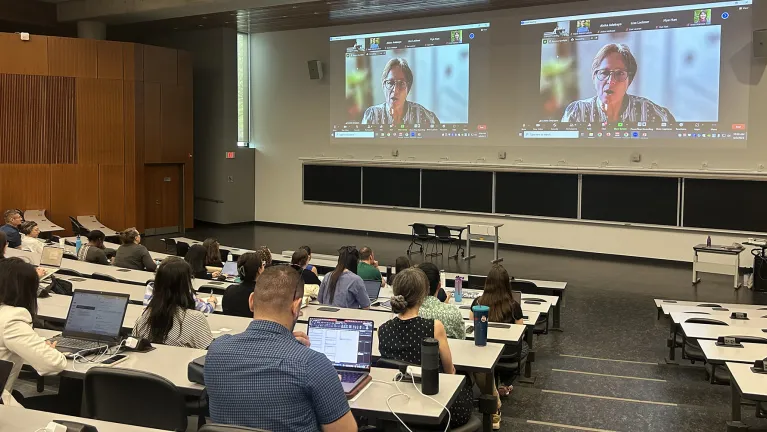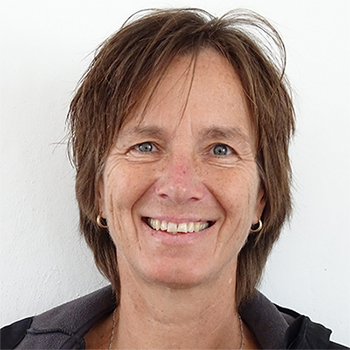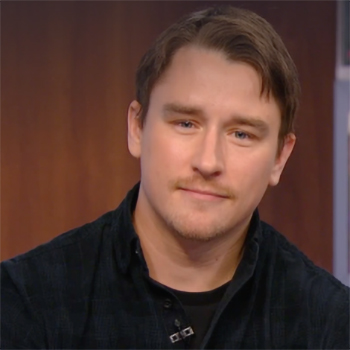Symposium 2023

Bridging the Gap between Theory and Practice: Challenges and Opportunities
Whether our work focuses more on practices or theories, or we are called to consider both dimensions at the same time, we all strive to bring coherence in our work by reflecting on how theory can inform our practice and how practice can feed back into theory. This year’s symposium aims specifically to elicit discussion about the complementarity of theory and practice in language and literacies education. The Symposium invites reflections on our collective experiences as scholars, practitioners, and learners navigating the ever-changing material conditions of our activities and promotes discussion about ways to decolonize both theory and practice.
To pursue these goals we will be guided by two plenary speakers operating in the languages and literacies field: one scholar working in the Latin American world and one Indigenous scholar. Scholars and graduate students will come together, in person or at distance, to share and discuss their recent, on-going or future research across different contexts, languages and cultures.
We invite you to submit paper presentations in which participants will discuss new research avenues such as, among others, bi-/multi-/trans-/plurilingualism in language education, multiliteracies and multimodalities, teachers’ and students’ agency, mobility, migration and inclusion, impact of language policies, innovation in language teaching methodologies and assessment, language acquisition and language use, technology-assisted language learning and teaching, and e-Learning and distance education.
The Symposium will provide a unique opportunity for scholars (faculty members and graduate students) working in languages/literacies education to learn about each other’s work, exchange ideas, and showcase or discuss their research. It will also provide a platform to establish and expand opportunities for academic networking for future collaborations.
University of Toronto Mississauga (UTM) is pleased to host and facilitate the fourth Symposium supported by the Centre for Educational Research on Languages and Literacies (CERLL) and strengthen the collaborative network in languages/literacies education research across Southern Ontarian Universities that the Symposium has created over the past years. The hybrid format will ensure that the Symposium continues to reach a broader, national and international audience as was the case in the past online editions. With plenaries, panel discussions, presentations and poster sessions as well as social events, the Symposium will provide all participants, from Ontario and beyond, with a unique opportunity to become a part of the broader languages/literacies education academic community.
Plenary Speakers
Colette Despagne is a Full Professor of (Critical) Applied Linguistics and Language Education at the Institute of Social Sciences and Humanities (ICSyH) at BUAP – Benemérita Universidad Autónoma de Puebla (BUAP), in Puebla, Mexico. She is member of the Mexican National Research Council (Sistema Nacional de Investigación – CONACYT) and leads the research group called “Racism, Identities, and Modes of Subjectivity” at BUAP. Colette Despagne holds a master’s degree in Applied Linguistics from the Université du Maine in France and a PhD in Educational Linguistics from Western University in Canada. She is plurilingual and lives in Mexico for nearly 30 years. She has presented in many different countries and published in several languages in international journals in Europe, Canada, the United States, Colombia and Mexico. She has been recipient of the Edmundo O’Gorman fellowship on behalf of the Institute of Latin American Studies at Columbia University in New York City in 2018.
Presentation Resources

Ryan DeCaire is Kanien’kehá:ka and was born and raised in Wáhta Mohawk Territory, Ontario. Ryan is a Kanien’kéha (Mohawk language) revitalization practitioner, teacher, and learner, and is currently an Associate Professor in the Department of Linguistics and the Centre for Indigenous Studies at the University of Toronto. His work focuses primarily on the role of adult language acquisition and use in Indigenous language revitalization, and specifically on best practices for developing advanced speaking proficiency in adults of Kanien’kéha.
Presentation Resources

Friday Session Speakers
University of Toronto
Title: A proposal for a plurilingual and critical approach to CLIL in Mexican public higher education
University of Toronto
Title: Deconstructing the Binary: Exploring the Benefits and Challenges of Plurilingual and Immersion Pedagogies
McGill University
Title: The Possibility of Localize Plurilingual Approaches in EFL Education at Secondary Schools in Mainland China
University of Toronto
Title: Participative plurilingual identity construction: a reflexive model for the second language classroom
Ohio State University & Bucknell University
Title: Multimodality and L2 Socialization in Digital Space
University of Silesia in Katowice, Poland
Title: Supporting students’ multiliteracy: redefining communicative competence by building upon Gen Z’s digital body language
Russian State University for the Humanities, Moscow, Russia
Title: Perception of the social robot for learning a foreign language by Russian students
University of Toronto & York University
Title: The case of Q-methodology: A collaborative, CDST-informed research method in applied linguistics
Ankara University, Erfurt University
Title: Major Sources of Lexical Errors in Second Language Writing in the Turkish Context
Western University
Title: Short Stories as a Bridge between Theory and Practice: Developing Reading Comprehension Skills among 4th, 5th, and 6th Grade Students in Iran
Jagannath University, Bangladesh
Title: Family language policies: Bangladeshi immigrant parents’ perceptions of maintaining children’s heritage language
University of Toronto
Title: A Plural, Intersectional Approach to Multiethnographic Methodologies: Investigating the Relationship between Plurilingual Identities and Practices
McGill University
Title: “Someone engaged in plurilingual practices with me but in a very racist way”: Exploring discrimination and plurilingualism among users non-official languages in Canada
York University
Title: Cultural and racial representations in French immersion classes: Perspectives from racially minoritized students
University of Toronto
Title: A Language Friendly Approach: Bridging the linguistic divide in education in Trinidad and Tobago
University of Toronto, Mississauga
Title: Examining important linguistic features of elicited imitation between proficiency levels: Insights from machine learning and corpus linguistics
Sunchon National University
Title: The Corpus-Aided Instruction for EFL College Students’ Writing Improvement
McGill University
Title: Writing in Secondary Schools: The Treatment of Authentic Writing in Foreign Language Curriculum
York University
Title: Resistance or maintenance? An autoethnographic reflection on the creation of an equitable language policy
University of Western Ontario
Title: Critically Reflecting on Identity Texts: Equity-Based Praxes and Teacher Education
University of Toronto Mississauga, York University, & University of Toronto
Title: Interconnections and Repertoires: Exploring the Linguistic and Social Integration of Adult Migrants across International Contexts
Saturday Session Speakers
University of Toronto
Title: Meta-tasks as an Operationalization of the Action-oriented Approach
Universidad de Santiago de Chile
Title: Bringing Together Theory and Practice through an Inclusive TESOL Research Community in Chile
Waterloo Rainbow District School Board
Title: Developing agency in the practice of supply teaching
University of Regina
Title: Plurilingualism as an Intrinsic Capacity: Exploring Chinese EFL Teachers’ Classroom Language Practices
Yıldız Technical University
Title: A Lesson Model for the Teaching of Turkish Verbal Participles via the Pedagogical Grammar
University of Toronto
Title: Building a Network of Support: Conversations with Teachers and School Leadership on the Introduction of a New Multilingual Digital Tool
Federal University of Mato Grosso do Sul
Title: The “Hand Talk” app and teaching English to Brazilian deaf students
Jagannath University
Title: Language teachers’ professional stress and emotions in online teaching
Western University
Title: Principles of Self-Efficacy and Students as Partners in Spanish as a Foreign Language Classrooms
University of Valencia
Title: Telecollaboration: A 21st century language teaching approach?
University of Toronto & York University
Title: Promoting language teachers’ agency through plurilingual, action-oriented, and technology-mediated approaches
University of Toronto
Title: Authentic and inclusive language education through plurilingual action-oriented scenarios: Lessons from an international partnership
Poster Sessions
- April Passi
- Gabrielle Forget
- Paddy Watson
- Leonie Hölderle
- Lu Xi
- Karen Andrews
- Li Peng
- Stephen Bahry/Zhe Chen
- Esther Hye-Min Yoon
- Irma Alarcon
- Rui Dong Chen
- Anna V. Sokolova Grinovievkaya
- Kevin Martens Wong
- Olga Tararova
- Ian McCallum
- Adriana Williams
- Xiaoyue Chen
- Esther Hye-Min Yoon
- Irma Alarcon
- Rui Dong Chen
- Anna V. Sokolova Grinovievkaya
- Kevin Martens Wong
- Olga Tararova
- Ian McCallum
- Adriana Williams
- Xiaoyue Chen
Committees
Organizing Committee
University of Toronto Mississauga
York University
University of Toronto Mississauga
OISE, University of Toronto
University of Waterloo
Western University
Western University
University of Toronto Mississauga
Graduate Student Organizers & Volunteers
Graduate Student Organizer, OISE
Graduate Student Organizer, OISE
Presented By
The Symposium 2023 is presented by the University of Toronto, Mississauga, and the Centre for Educational Research in Languages and Literacies (CERLL) at the Ontario Institute for Studies in Education, University of Toronto. It is in collaboration with the Graduate Program in Linguistics & Applied Linguistics of the Department of Languages, Literatures and Linguistics at York University, the Department of Germanic and Slavic Studies at the University of Waterloo, and the Faculty of Education at Western University.





